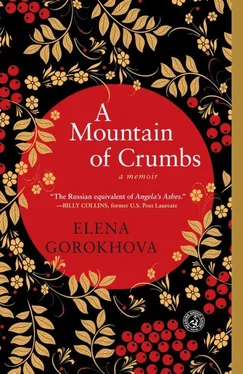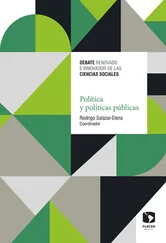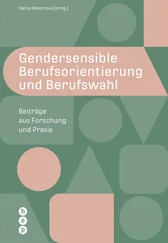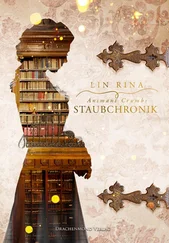Dedushka loves to be in charge. The commander, my grandmother calls him. She looks at him out of the kitchen window, washing plates in a kettle of warm water, the skin around her eyes folding into deeper pleats with a smile from behind her glasses.
“Time to water!” he commands precisely at seven, when the sun begins to roll down the sky toward our fence. Obediently, as if she has suddenly become a different person, docile and quiet, my mother carries two watering cans from the barn. Dedushka cranks the rusty handle of our well until a chained bucket falls into the water. Leaning onto the well frame, I look down, but it is so deep I can never see the water; I only hear the bucket twitching on its chain and then a splash. With both hands, Dedushka draws the bucket up, into daylight. Two bucketfuls, one after the other, to fill two watering cans that my mother drags to the beds of radishes, carrots, and beets and then to the hothouse for the tomatoes. She walks slowly, her shoulders pulled down by her load, and I wish it had rained so Dedushka wouldn’t make her do all this lifting and lugging.
Dedushka would like to commandeer my father, too, when he arrives on Saturday night with Uncle Volodya, but he knows better than to try. There’s no road, so they drive up the field dotted with the blue stars of cornflowers and buttery cups of yellow flowers called chicken blindness. If eaten, I am told, these flowers can cause instant blindness, especially in chickens. My father and Uncle Volodya bump on ruts, announcing their arrival with rattling we hear all the way from the veranda, and leave the car by the back gate, next to the compost pile. I run out to meet them, to inhale my father’s smell of tobacco and the car’s odor of gasoline that laps around it in thick, sticky waves. Aside from compulsory watering and weeding, so little happens in the dacha that any distraction—a trip to the grocery store or a truck hurtling by—makes the day memorable. But my father’s arrival is special. A whole Sunday is in front of us, with possibilities that seem infinite, with Uncle Volodya stroking his thinning hair and telling a story about a militia traffic post, with my father at the head of the table, all mine, slurping spoonfuls of cabbage soup.
When my father is in the city working, the head of the table becomes Dedushka’s place. Right now Dedushka is outside. He doesn’t like to give up his commanding post at the table, so the minute Uncle Volodya’s car rattle reaches the house he remembers that it is time to prune or weed or fertilize. I glance out the window and see him by the currant bush, inspecting its branches and sifting white powder from a small bag onto the leaves, pretending he didn’t see the car drive up the field.
“Want to go fishing tomorrow?” My father puts the spoon down and looks at Uncle Volodya.
“I want to go fishing!” I shout and jump off the bench.
“Sit down,” says my mother. “You haven’t finished your compote.”
I don’t want any more compote. I want to go fishing.
“What kind of fisherman are you?” asks my father. “Ot gorshka dva vershka .” Two inches taller than a potty.
“I’ll be the best fisherman,” I promise and press my palms to the sides of my sundress, standing at attention for a moment. “I’ll catch a fish this big.” I open my arms as wide as I can and push my shoulder blades together to increase the span.
“The house needs painting,” my mother says. “Last Sunday it rained.”
Uncle Volodya, who already heard this argument a week earlier, feels in his pockets for cigarettes and goes out onto the porch.
“No,” says my father. “You’ll catch a fish this big.” He holds his thumb and forefinger an inch apart.
Dedushka walks up the porch past Uncle Volodya, waving away the cigarette smoke.
“Do we have enough paint?” my mother asks, directing her question to Dedushka, who is now conveniently within earshot.
“Let’s go, I need some help with the stove,” says grandma, and she pulls Dedushka by the sleeve toward the kitchen, away from the painting debate my father doesn’t like.
He pulls his elbow out of her grip. “We have five liters in the barn,” he says and straightens his shoulders. “That should be enough.”
“I want to go fishing,” I wail after my father as he gets up, leaves the veranda, and joins Uncle Volodya on the porch. “Please, please, please.” I know he left because he doesn’t like to take orders from Dedushka, who thinks he can be the commander of all of us.
My mother and Dedushka are on the veranda alone now. No one else wants to think about painting the house, not with Sunday almost here, not with my father clattering inside the barn in search of fishing rods.
AT NIGHT, I DREAM about fishing. In my hand I am holding an oar, heavy and damp, which silently cuts into the dark water beneath the boat. I cannot see my father’s face under the visor of his cap: he has lowered his head to his cupped hands, trying to light a cigarette. Writhing on the bottom of the boat, in an inch of murky water, are two purple worms that have escaped from a tin filled with dirt. We dug them up at five that morning, from the boat keeper’s compost pile.
The clouds over the Gulf of Finland glimmer with a lemon tinge along the line where they roll into the water—a hint of the sun still hidden away, like a row of dimmed stage lights.
“Look beyond that light,” says my father. “Look hard and you’ll see people filing into the theater. You’ll see ushers run up and down the aisles; people talk, programs rustle—you’ll hear a murmur. When the lights start to dim, the murmur rises, and then, just a moment before the curtain goes up, the noise stops—everyone in the house holds their breath, everyone knows what is going to happen. This is the moment I’ve always loved most: the anticipation of magic, the expectation of illusion.”
I don’t know why my father is speaking about theater as if he were an actor, or even a devoted fan, but I don’t question it. I cannot see his face because he is looking away, at the horizon, into the audience. “Don’t let the magic slip away,” he says, “or you’ll sink into the quicksand of the ordinary.”
“How will I recognize the magic?” I ask, but I have no voice, and I just keep opening my mouth, like the perch I caught last summer, twitching on the bottom of our boat.
Somehow, in a way that happens only in dreams, he hears the question. “You will know,” he says and looks at me from under the visor of his cap. “You will know because the noise will stop.”
I WAKE UP WHEN light has already bled into the air and made the sky blush. I am petrified that I may have overslept and missed the fishing trip, all as a result of wallowing in weird dreams about theater and fishing.
It is almost seven. A kettle begins to whistle on a hot plate and my mother, her hand wrapped in a rag, takes it off and pours boiling water into a teapot. I run to the veranda in search of my father.
He sits in his place at the head of the table, with his glasses on, reading the Pravda he brought with him from the city as though this is an ordinary day with nothing planned.
“When are we going fishing?” I demand.
He lowers the paper and his glasses, peering at me from above the rims, which gives his face a slightly facetious look.
My mother enters the veranda with the teapot in one hand and the kettle in the other. “Who is it that is going fishing?” she asks. Her tone is too familiar, the voice of a professor admonishing a student.
I look at my father. “You said yesterday we could go.” I try not to glance at my mother pouring boiling water into his cup. “You said we would go fishing.” I see her straightening up, preparing to speak. “You promised,” I say, bending what was said yesterday in the veranda a few millimeters to my advantage.
Читать дальше












